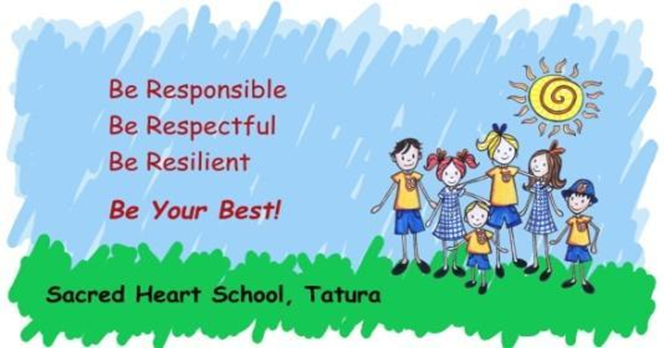Thrive & Flourish

Dear Parents and Caregivers,
We hope you have had a good start to the term. There is a lot going on in our world at the moment – both locally and overseas. Information is continually being broadcast on a variety of media-platforms and this can bring about feelings of uncertainty and anxiety in us all. Below is some information and support on how to have conversations with your children.
How to Talk to About Current Events and What is on the News
With an unprecedented focus on current events in the media; military conflicts, localised events and tragedies, - parents and caregivers are taking new responsibilities in helping their children process what they see on the news and in the media. Children may be watching the unfolding and unsettling events happening in the Middle East, plus isolated incidents that have happened here at home. Children, more than ever, are inundated with current events (the good, the bad, and the ugly) and are often left confused, scared, and sometimes angry. Many have questions and are wanting to understand the world around them.
Below are a few useful tips in having these conversations with your children at home:
Don’t avoid these conversations. Having these difficult conversations about current events shows children that these topics are not taboo and are important to discuss. Although it may feel daunting to have these conversations with your children, avoidance often leaves them on their own to figure things out and they become vulnerable to misinformation, misconceptions, and confusion. Therefore, having an open dialogue with your children on what they see on the news is critical to their growth and understanding of the world around them.
Tell the truth, but share only as much as your child needs to know. Try to calm any fears and help children feel safe. Don't offer more details than your child is interested in.
Keep these conversations ongoing. Communicate clearly with your children that the family can discuss current events at any time, that they have a safe place to process their thoughts, and that you are open to any additional questions in the future. Also, it is okay if you don’t know the answer to your children’s questions - it can be an opportunity to find the answers together!
Start with open ended questions. Open-ended questions allow parents and caregivers to gauge what the child already knows. These questions can look different for each family but examples include, “what have you heard?” or “what questions do you have?” Additionally, it is important to communicate in age and developmentally appropriate ways.
Validate your child’s feelings and give them appropriate reassurances. Children can have many emotional reactions to dealing with the uncomfortable or unsettling topics on the news. Be sure to validate their feelings, eg: “It makes sense that you feel frightened by these events. I do too.”. This gives children security and comfort and will help you, as the parent or caregiver, achieve better conversational outcomes. Helpful validation starters include, “I hear you,” “I understand,” or “It makes sense that…”
Additionally, you can give your child time to process the new information by utilising relevant tactics to help them comprehend the situation better. For example, drawing, painting, or acting out stories with toys can all be helpful tools for children in the expression of their thoughts and feelings related to the news.
Spread compassion, not stigma. Conflict can often bring with it prejudice and discrimination, whether against a people or country. When talking to your children, avoid labels like “bad people” or “evil” and instead use it as an opportunity to encourage compassion, such as for the families forced to flee their homes.
Remind your children that everyone deserves to be safe at school and in society. Bullying and discrimination is always wrong and we should each do our part to spread kindness and support each other.
Focus on the helpers. It’s important for children to know that people are helping each other with acts of courage and kindness. Find positive stories, such as the first responders assisting people, or young people calling for peace.
Remember you can limit exposure to the news. Think about how old your children are and how mature they are. Encourage them to take breaks from following the news, especially when the topics are difficult. Turn off the TV so the news is not playing in the background all day.
Prayer provides an opportunity for action, calm, support and comfort in times of distress and disruption. As a family, you might offer a prayer, or light a candle for someone in need.
Parents/guardians are responsible for making sure that all children attend school every day unless they are too unwell, in which case the school must be advised. If families are going to be away for an extended period, (eg: family holiday), we ask that prior notice is given to the school, so that if parents wish, a learning program can be put in place for their children.
We thank you for your support with this.
Wellbeing Support
Wellbeing support can be accessed in the following ways:
- Any staff member can arrange for a referral to Student Wellbeing if they have concerns about a student’s wellbeing.
- Parents can also request support for their child/ren by contacting a member of the wellbeing team at school.
Email:
Tony McDonald: tmcdonald@shtatura.catholic.edu.au
Felicity Bryant: fbryant@shtatura.catholic.edu.au
Deb Turvey: dturvey@shtatura.catholic.edu.au
- At times, a student may be referred to an external support service. We also respect the fact that some students and parents may prefer to seek professional support independent from the school setting. In such cases, Sacred Heart values working collaboratively with external support services. We encourage parents/carers to communicate with the school if there is a significant issue affecting their child’s wellbeing.
If ever you need help sorting out personal or family issues, give CatholicCare Victoria a call. They offer many services to all members of our community – ALL FREE.
Have a great fortnight everyone.







